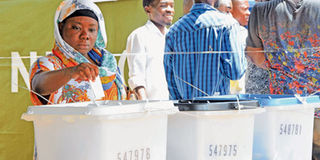Election 2020: Nearly half of 29 million registered voters stayed away

A resident of Tegeta, a suburb of the City of Dar es Salaam, Husna Abdul, casts her ballot at the Tegeta-Wazo Hill Polling Station in the city during the General Election held on Wednesday, October 28, 2020. PHOTO | Ericky Boniphace
What you need to know:
A total of 14,662,746 registered voters across the country, which is 49.27 percent of the total registered voters, did not vote in this year’s General Election.
Dar es Salaam. An analysis of data released by the National Electoral Commission (NEC) in relation to the October 28, 2020 elections shows that nearly half of registered voters stayed away from the polls.
A total of 14,662,746 registered voters across the country, which is 49.27 percent of the total registered voters, did not vote in this year’s General Election.
NEC announced on Friday that the voters who turned out to vote were 15,091,950 (50.72 percent) out of the 29,754,696 registered voters.
This year’s turnout is lower compared to the 67.34 percent of registered voters, who voted in the 2015 General Election.
In 2015, a total of 15, 596,110 votes were cast for the presidential election against 23,161, 440 registered voters.
In the past five polls, the highest turnout was in the 2000 presidential election, where over 84.4 percent of the total 10,088,484 registered voters cast their votes.
The following election in 2005 also had a relatively big turnout as 72.23 percent of the total 16,442,657 registered voters cast their votes.
The 2010 general election had the lowest turnout of 42.8 percent, as only 8,626,283 registered voters cast their votes against 20, 137,303, who had been registered.
Views on the voter apathy
Speaking to The Citizen, political analysts tried to explain this phenomenon of voters staying away from the ballot box.
Prof Ibrahim Bakari of the University of Dar es Salaam (UDSM) said lack of faith in the electoral system in the country is one of the reasons people did not turn out.
“People did not vote due to varied reasons. Some were far from their registered stations while others saw no value of spending their time in the process as they had no trust in the whole electoral system,” he observed.
Prof Bakari added: “If you take a look back during the campaign period, one would expect that the voter turnout would be big, however, there is a series of events that has caused people to lose interest in voting.”
He pointed out that the authorities must seriously contemplate the matter and find a solution, particularly in restoring people’s confidence in the electoral system.
“The number of voters would definitely rise if people started to have confidence in such institutions as the police, security forces, and NEC,” he observed.
Tanzania Constitution Forum’s executive director Bob Wangwe cast doubts in the statistics provided by the electoral body, expressing his belief that the number of votes cast were lower than the announced 15 million in this year’s elections.
“You can’t rule out complaints raised that some votes had been cast even before agents arrived at some polling stations,” he alleged.
For his part, Dr Paul Luisulie, a political analyst from the University of Dodoma, noted that there was another category of voters who gave priority to their social and economic development obligations or emergencies.
He said on the Election Day people continued to tend to their daily social activities and some even travelled as per their earlier plans.
“There were those who fell sick on the Election Day or some who had to attend to urgent matters,” said Dr Luisulie.
He commended NEC for allowing those who had lost their voter IDs to use other recognised forms of identification to cast their votes.
“If we want to improve the number of voters, the government can also start using the online systems for the next elections as it is done in developed countries, this would make more people to come out and vote,” he said.
For his part, Mr Bubelwa Kaiza, a civil society advocate, noted that NEC should not remain mum over the matter of low voter turn out.
He said the body should come out and explain the reasons behind low voter turn out and what it intends to do to rectify the situation.
“There were huge crowds in campaign meetings, so I don’t see why it was possible that on the Election Day people did not turnout,” he said.
On Friday, NEC chairman Judge Semistocles Kaijage announced CCM’s John Magufuli as the overall winner of the polls which were held on Wednesday, October 28.
Dr Magufuli, the incumbent President, recorded 12,516,252 votes of the total votes cast. His closest challenger, Tundu Lissu, recorded 1,933,271 votes of the total ballots cast on Wednesday’s polls.




